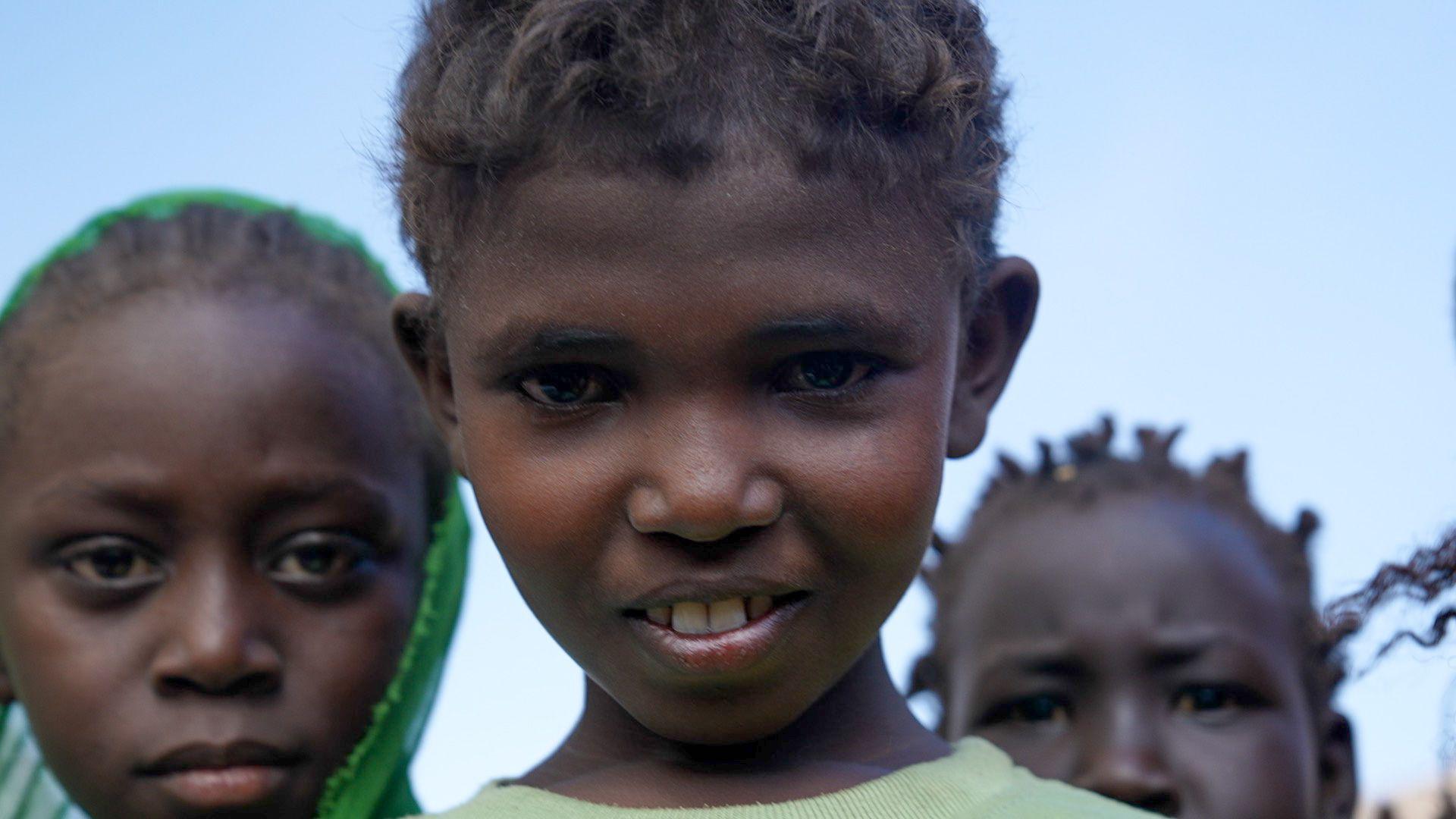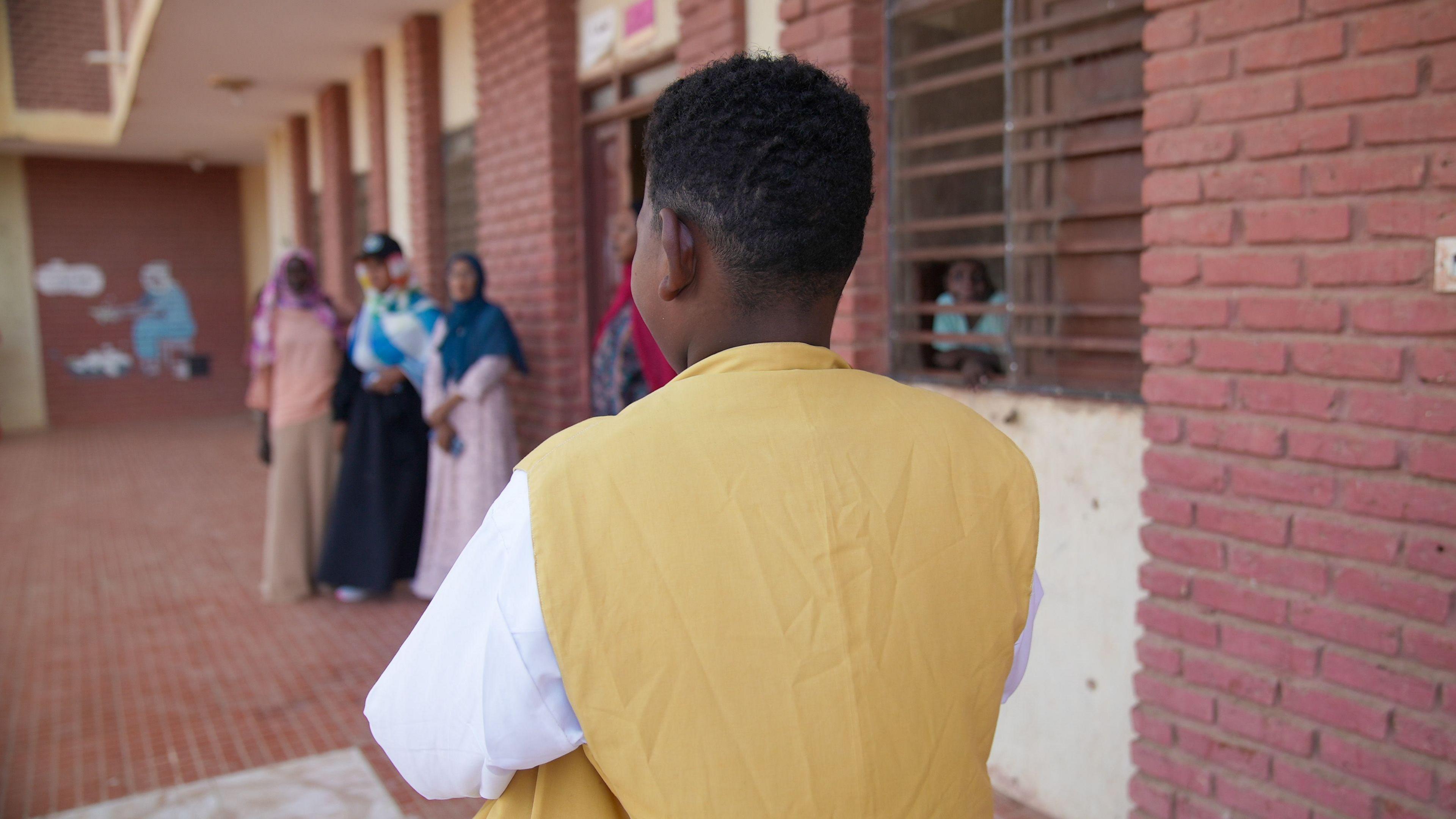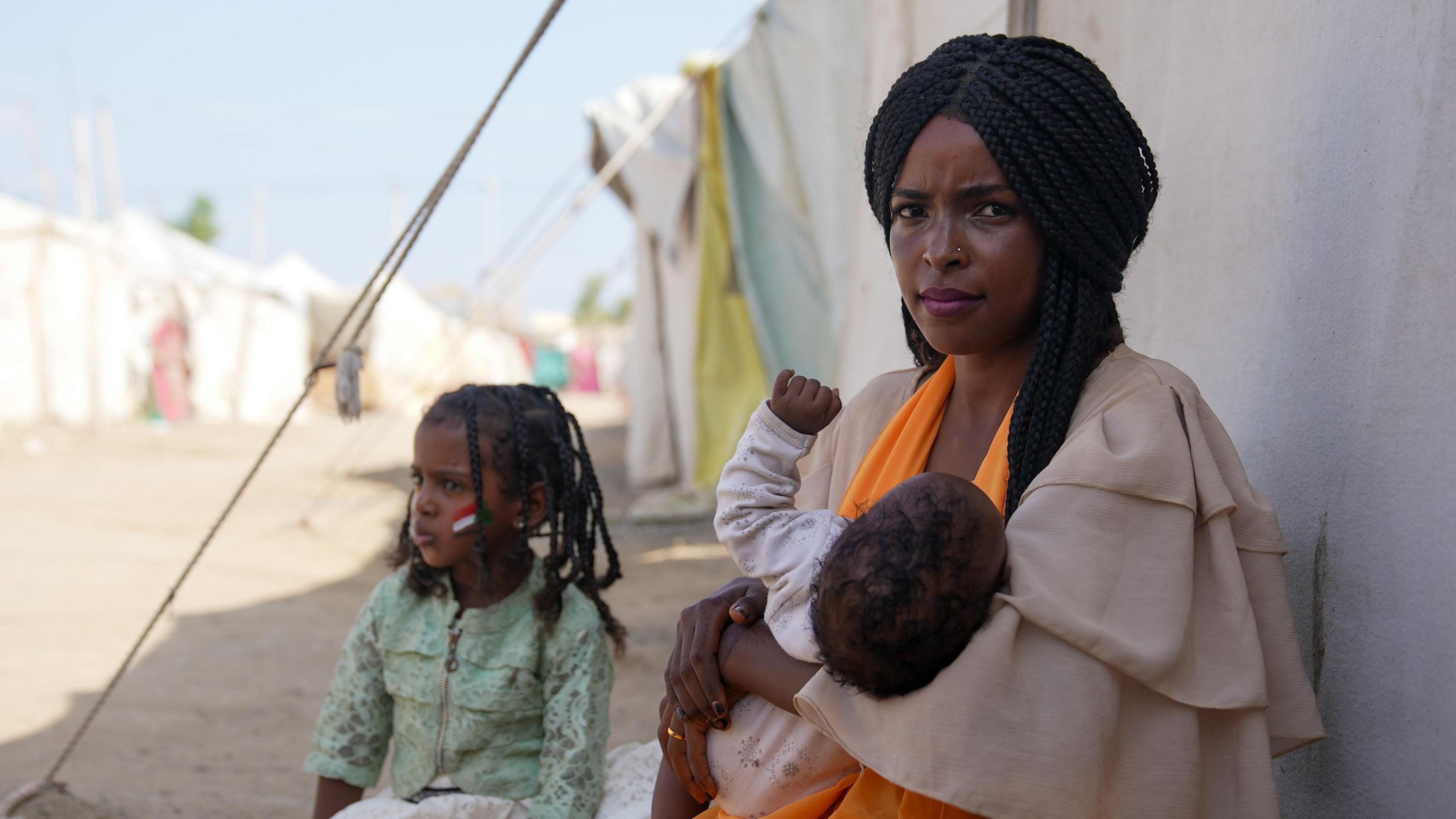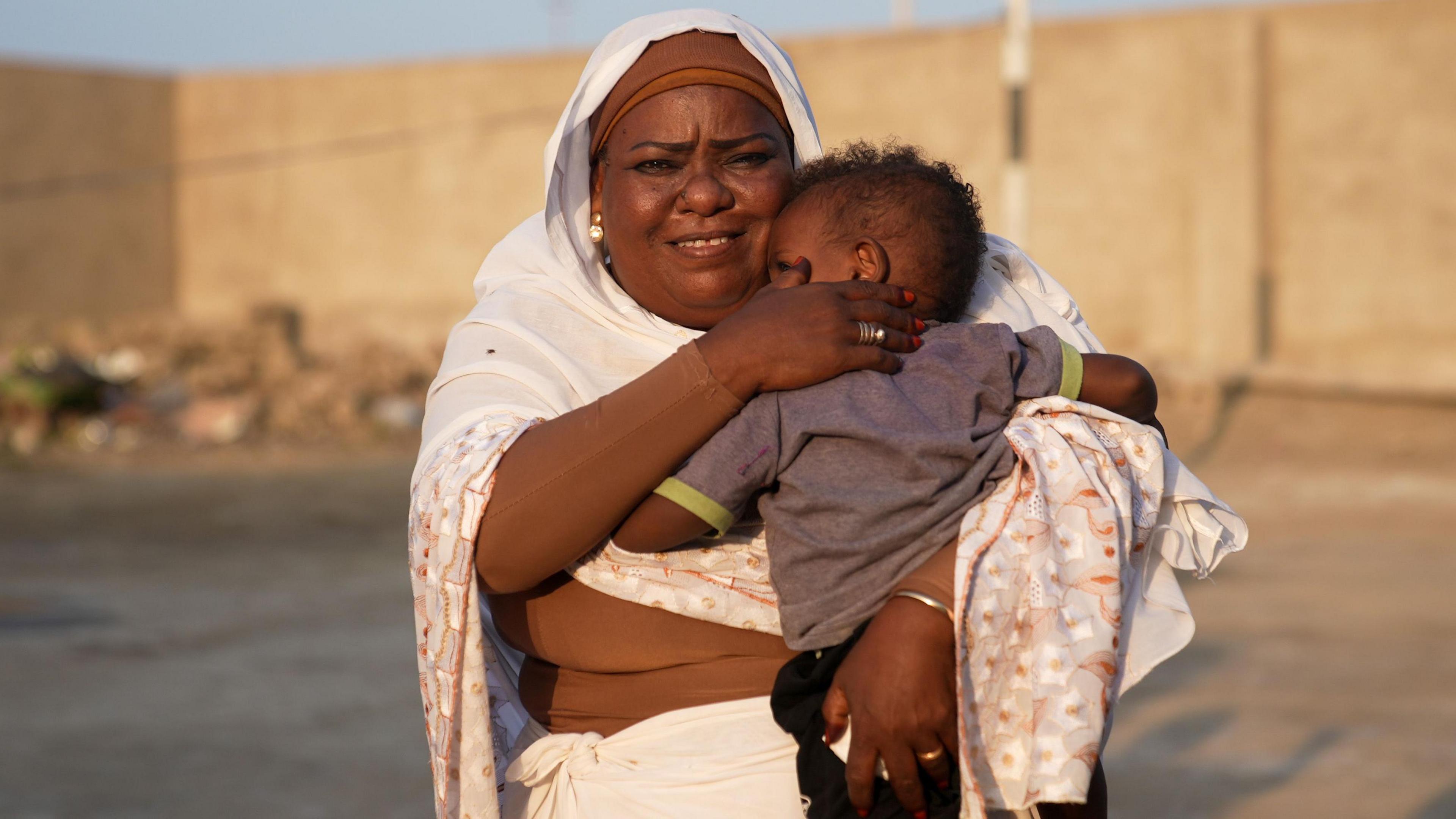Sudan's 'invisible crisis' - where more children are fleeing war than anywhere else

More than five million children have fled their homes in Sudan
- Published
Mahmoud is a cheeky teenager who beams the biggest of smiles even though he lost his front teeth in the rough and tumble of kids’ play.
He is a Sudanese orphan abandoned twice, and displaced twice in his country’s grievous war - one of nearly five million Sudanese children who have lost almost everything as they are pushed from one place to the next in what is now the world’s worst humanitarian crisis.
Nowhere else on Earth are so many children on the run, so many people living with such acute hunger.
Famine has already been declared in one area - many others subsist on the brink of starvation not knowing where their next meal will come from.
"It’s an invisible crisis," emphasises the UN’s new humanitarian chief Tom Fletcher.
"Twenty-five million Sudanese, more than half the country, need help now," he adds.
In a time of all too many unprecedented crises, where devastating wars in places like Gaza and Ukraine dominate the world’s aid and attention, Mr Fletcher chose Sudan for his first field mission to highlight its plight.
"This crisis is not invisible to the UN, to our humanitarians on the front line risking and losing their lives to help the Sudanese people," he told the BBC, as we travelled with him on his week-long trip.
Most of the people on his team working on the ground are also Sudanese who have lost their homes, their old lives, in this brutal struggle for power between the army and paramilitary Rapid Support Forces (RSF).
Mr Fletcher's first field visit took him to Mahmoud’s Maygoma orphanage in Kassala in eastern Sudan, now home to nearly 100 children in a crumbling three-storey school-turned-shelter.
They lived with their carers in the capital, Khartoum, until the army and RSF turned their guns on each other in April 2023, trapping the orphanage as they dragged their country into a vortex of horrific violence, systematic looting and shocking abuse.
When fighting spread to the orphans’ new shelter in Wad Madani, in central Sudan, those who survived fled to Kassala.
When I asked 13-year-old Mahmoud to make a wish, he immediately broke into a big gap-toothed grin.
"I want to be a state governor so I can be in charge and rebuild destroyed homes," he replied.

Mahmoud, now 13, has been displaced twice since conflict broke out in Sudan last year
For 11 million Sudanese driven from one refuge to the next, returning to what is left of their homes and rebuilding their lives would be the biggest gift of all.
For now, even finding food to survive is a daily battle.
And for aid agencies, including the UN, getting it to them is a titanic task.
After Mr Fletcher’s four days of high-level meetings in Port Sudan, army chief Gen Abdel Fattah al-Burhan announced on the X social media site that he had given the UN permission to establish more supply hubs and to use three more regional airports to deliver assistance.
Some of the permissions had been granted before but some marked a step forward.
The new announcement also came as the UN’s World Food Programme (WFP) secured a green light to reach stricken communities behind lines controlled by the RSF, including the Zamzam camp in Darfur housing about half a million people where famine was recently confirmed.
"We’ve been pushing for months to get to these communities," says Alex Marianelli, who heads WFP’s operations in Port Sudan.
Behind us in a WFP warehouse, Sudanese labourers sing as they load trucks with boxes of food heading for the worst of the worst areas.
Mr Marianelli reflects that he has never worked in such a difficult and dangerous environment.

About 11 million people have been forced to flee their homes because of the conflict
Within the aid community, some criticise the UN, saying that its hands have been tied by recognising Gen Burhan as the de facto ruler of Sudan.
"Gen Burhan and his authorities control those checkpoints and the system of permits and access," Mr Fletcher says in response.
"If we want to go into those areas we need to deal with them."
He hopes the rival RSF will also put the people first.
"I’ll go anywhere, talk to anyone, to get this aid through, and to save lives," Mr Fletcher adds.
In Sudan’s merciless war, all warring parties have been accused of using starvation as a weapon of war.
So too sexual violence, which the UN describes as "an epidemic" in Sudan.
The UN visit coincided with the "16 days of activism" marked globally as a campaign to stop gender-based violence.
In Port Sudan, the event in a displaced camp, the first to be set up when war flared, was especially poignant.
"We have to do better, we must do better," vowed Mr Fletcher, who cast aside his prepared speech when he stood under a canopy facing rows of Sudanese women and children, clapping and ululating.
I’ll go anywhere, talk to anyone, to get this aid through, and to save lives"

I asked some of the women listening what they made of his visit.
"We really need help but the major job should be from the Sudanese themselves," reflects Romissa, who works for a local aid group and recounts her own harrowing journey from Khartoum at the start of the war.
"This is the time for the Sudanese people to stand together."
The Sudanese have been trying to do a lot with a little.
In a simple two-room shelter, a safe house called Shamaa, or "Candle", brings some light to the lives of abused single women and orphaned children.
Its founder, Nour Hussein al-Sewaty, known as Mama Nour, also started life in the Maygoma orphanage.
She also had to flee Khartoum to protect those in her care. One woman now sheltering with her was raped before the war, then abducted and raped again.
Even the formidable Mama Nour is now at breaking-point.
"We are so exhausted. We need help," she declares.
"We want to smell the fresh air. We want to feel there are still people in the world who care about us, the people of Sudan."

Mama Nour runs a safe house for abused single women and orphans, and has fled along with those in her care
More on the crisis in Sudan:

Go to BBCAfrica.com, external for more news from the African continent.
Follow us on Twitter @BBCAfrica, external, on Facebook at BBC Africa, external or on Instagram at bbcafrica, external